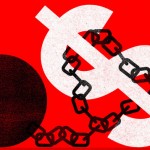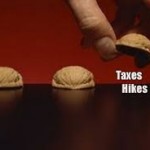
Special Guest: Tim Price – PFP Group
Tim recalls the words we last heard in the dark days of 2008:
“When you’re a distressed seller of an illiquid asset in a market panic, it’s not even like being in a crowded theater that’s on fire. It’s like being in a crowded theater that’s on fire and the only way you can get out is by persuading somebody outside to swap places with you .”
This is precisely what occurs when the regulatory pressures and un-natural forces of FINANCIAL REPRESSION finally ends
“Financial Repression is government stealing from savers and the future!”
“The single biggest problem of our times economically, is that for the last 40 years there has been an unsustainable buildup of credit expansion throughout the developed world … and we have reached the end of the road new. Every policy by governments and their agents (the central banks) is too a) Kick the Can Down the Road and B) to steal from savers to keep this bandwagon rolling!”
THREE ALTERNATIVE APPROACHES TO ATTEMPT A RESOLUTION:
- Generate Sufficient Economic Growth to Keep Servicing the Debt,
- Repudiation or Debt Default,
- An Explicit Policy of State Sanctioned Inflationism.
Approach #1 and #2 or no longer realistically viable, leaving governments with only option #3. The last options has historically always been the option governments of fiat based systems have resorted to throughout the ages because of a lack of “political will and discipline”.
Tim believes Japan is presently the ‘dress rehearsal’ and the rest of the world will be the main event.




 11/15/2014 - Tim Price – Speaking Out on Financial Repression
11/15/2014 - Tim Price – Speaking Out on Financial Repression














 “Financial repression always consists of a combination of different measures, which lead to a significant narrowing of the universe of investable assets for investors. Money, which in a more liberal investment environment would have flowed into other asset classes, is channeled in a different direction. The goal of financial repression is an indirect reduction of government debt by means of the targeted manipulation of the cost of government debt, most of the time accompanied by steady inflation. Financial repression is ultimately a government-imposed transfer of wealth .. A preferably “quiet debt reduction” is supposed to be achieved by the following
“Financial repression always consists of a combination of different measures, which lead to a significant narrowing of the universe of investable assets for investors. Money, which in a more liberal investment environment would have flowed into other asset classes, is channeled in a different direction. The goal of financial repression is an indirect reduction of government debt by means of the targeted manipulation of the cost of government debt, most of the time accompanied by steady inflation. Financial repression is ultimately a government-imposed transfer of wealth .. A preferably “quiet debt reduction” is supposed to be achieved by the following





 Hong Kong-based Fung Global Institute essay gives tribute to Ronald McKinnon who died earlier this month & who is author of the 1973 bookMoney and Capital in Economic Development .. a treatise on how governments that engage in financial repression hamper financial development .. they highlight how McKinnon was working on a related concept – a dollar-renminbi standard which was being designed to help alleviate the financial repression & fragmentation undermining global financial stability & growth .. “The notion that the dollar’s global dominance is contributing to financial repression represents a significant historical shift .. Speculative inflows of ‘hot’ money have weakened China’s macroeconomic tools and fueled ever more financial repression .. The world needs its two largest economies to work together to bolster global monetary stability. Together, China and the U.S. can alleviate financial repression, avert protectionist tendencies, and help maintain a strong foundation for global stability .. It is time for U.S. leaders to recognize that what former French Finance Minister Valéry Giscard d’Estaing called the ‘exorbitant privilege’ that the dollar’s global dominance affords America also entails considerable responsibility. Global monetary stability is, after all, a public good.”
Hong Kong-based Fung Global Institute essay gives tribute to Ronald McKinnon who died earlier this month & who is author of the 1973 bookMoney and Capital in Economic Development .. a treatise on how governments that engage in financial repression hamper financial development .. they highlight how McKinnon was working on a related concept – a dollar-renminbi standard which was being designed to help alleviate the financial repression & fragmentation undermining global financial stability & growth .. “The notion that the dollar’s global dominance is contributing to financial repression represents a significant historical shift .. Speculative inflows of ‘hot’ money have weakened China’s macroeconomic tools and fueled ever more financial repression .. The world needs its two largest economies to work together to bolster global monetary stability. Together, China and the U.S. can alleviate financial repression, avert protectionist tendencies, and help maintain a strong foundation for global stability .. It is time for U.S. leaders to recognize that what former French Finance Minister Valéry Giscard d’Estaing called the ‘exorbitant privilege’ that the dollar’s global dominance affords America also entails considerable responsibility. Global monetary stability is, after all, a public good.”






